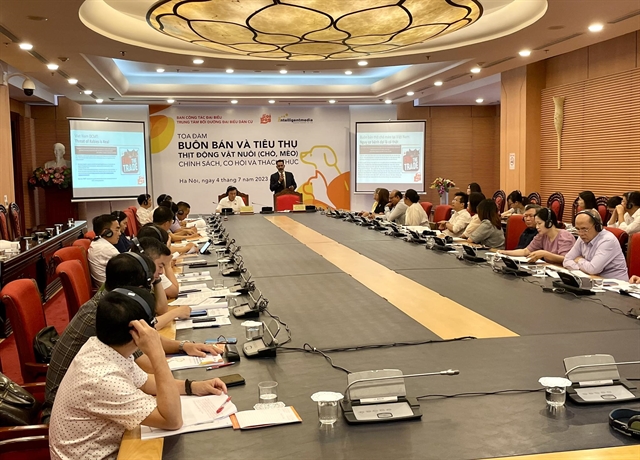
Delegates discuss strategy and roadmap to combat dog and cat meat consumption and trade in Hà Nội on July 4. — VNS Photo Thanh Hải
HÀ NỘI — Measures to combat dog and cat meat consumption and trade were the main topics of a workshop jointly organised by Soi Dog Foundation International, advocacy group Intelligentmedia and the National Assembly on July 4.
The event, bringing together nearly 50 NA deputies, government officials and specialists, highlights the value of the National Assembly uniting various stakeholders in Vietnamese society to tackle the issue as a serious and urgent problem and build momentum toward responsible pet guardianship.
At the event, participants heard about how five million dogs and one million cats are brutally traded and killed for meat yearly in Việt Nam. The World Health Organisation warns that the trade, slaughter, and consumption of dogs pose public health risks that include trichinellosis and cholera and particularly the deadly rabies virus. Despite the increasing number of citizens who are fighting to end this practice, some groups still consider dog and cat meat a delicacy. This motivates traders to continue their work in wet markets.
The discussions encourage a more comprehensive understanding of the existing situation of the dog and cat meat trade in Việt Nam, the efforts of various authorities and ministries on pet management, associated legal frameworks, and communication attempts.
“Dog and cat meat trade and consumption are increasingly pressing issues that draw the attention of authorities and the community. Animal management and welfare have also been discussion topics of the government’s supervisory sector. Việt Nam has a legal framework on the issue, but enforcement contains many loopholes," said Nguyễn Tuấn Anh, Vice Chairman of the Board of The Deputy Affairs under the NA’s Standing Committee.
"In addition, it is necessary to promote communication campaigns across the country that not only help strengthen welfare standards for animals but can also raise the public's awareness of the prevention of zoonotic disease risks in the community. Personally, I support innovative and impactful initiatives to reduce and stop the trade and consumption of dog and cat meat in Việt Nam;” Anh said.
Participants also discussed a strategy and roadmap to develop Hà Nội to become a dog and cat meat-free city. They heard that dog and cat meat consumption was rooted in local culture. Public education and awareness strengthening should be at the forefront of tackling the issue. In the long run, an evidence-based, comprehensive, and targeted social and behavioural change initiative should be employed to initiate and sustain a change of practice.
Tạ Văn Tường, Vice Director of Hà Nội Agriculture Department, said that phasing out dog and cat meat trading was key to attracting more tourists who are increasingly caring for environmental tourism services and animal welfare conditions.
"In the short term, Hà Nội should adopt anti-rabies measures, establish a safety zone for vaccinated dogs, and strictly control the trade and consumption of dog and cat meat. Additionally, local authorities should work hard to increase education, public awareness, control unleashed dogs and enhance animal welfare regulations and settle violations. This contributes to making the image of a modern and civilised city,” said Trường.
“The ultimate goal is a ban, initially at the provincial level like with Hà Nội capital, on the trade and slaughtering of dogs and cats, and their consumption. The partnership with the National Assembly has marked a critical milestone in raising the profile of the issue to the top of the government so that laws and regulations to control the dog and cat meat trade will be further improved and enforced. We are also committed to supporting the authorities, civil society associations and other relevant stakeholders to adopt a thoughtful and multi-faceted approach which will include education, legislation, promoting alternatives, cultural change, and collaboration leading to a zero-tolerance attitude against the consumption of dog and cat meat,” said Rahul Sehgal, Director, International Advocacy of Soi Dog Foundation International. — VNS
OVietnam